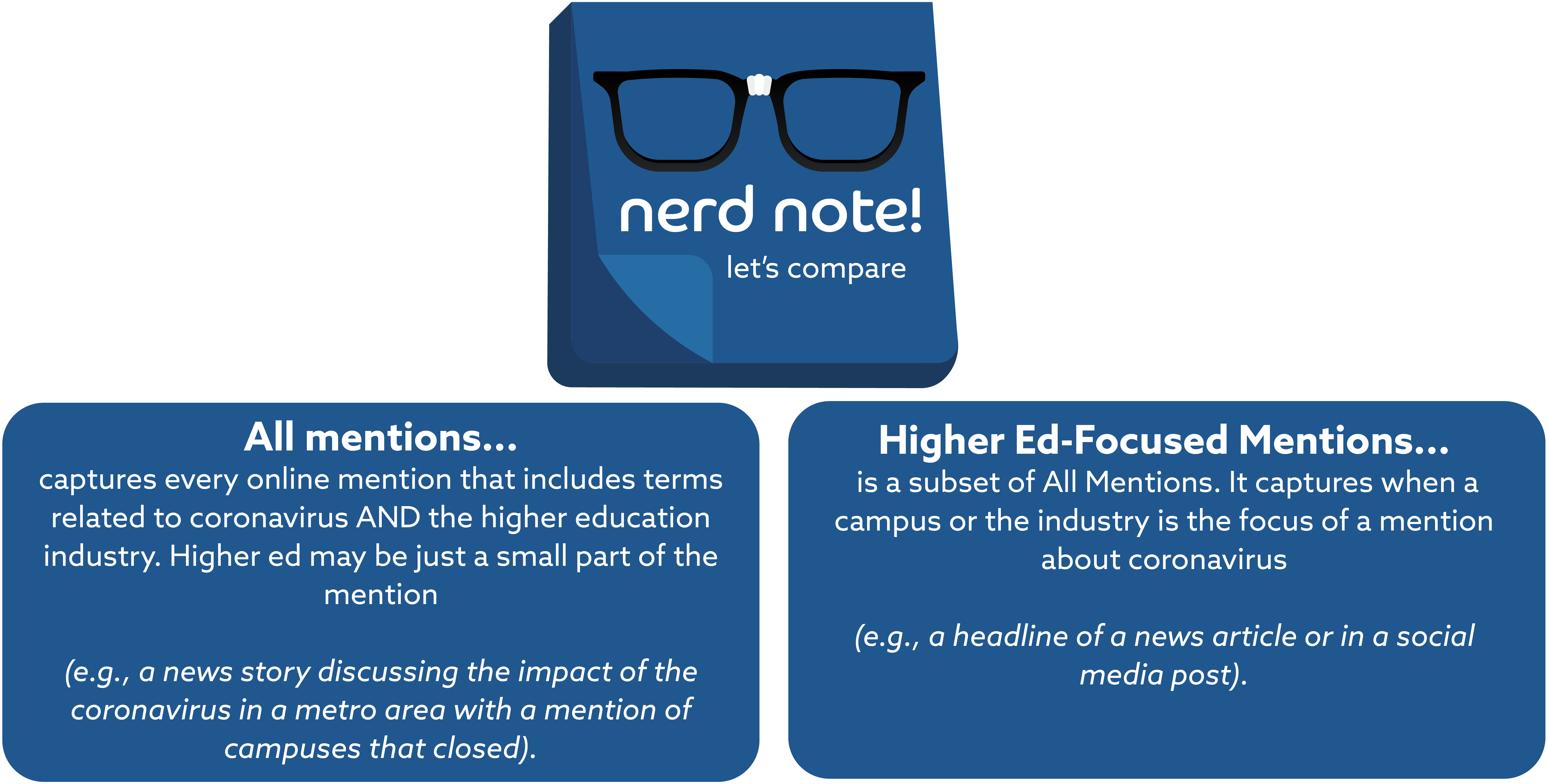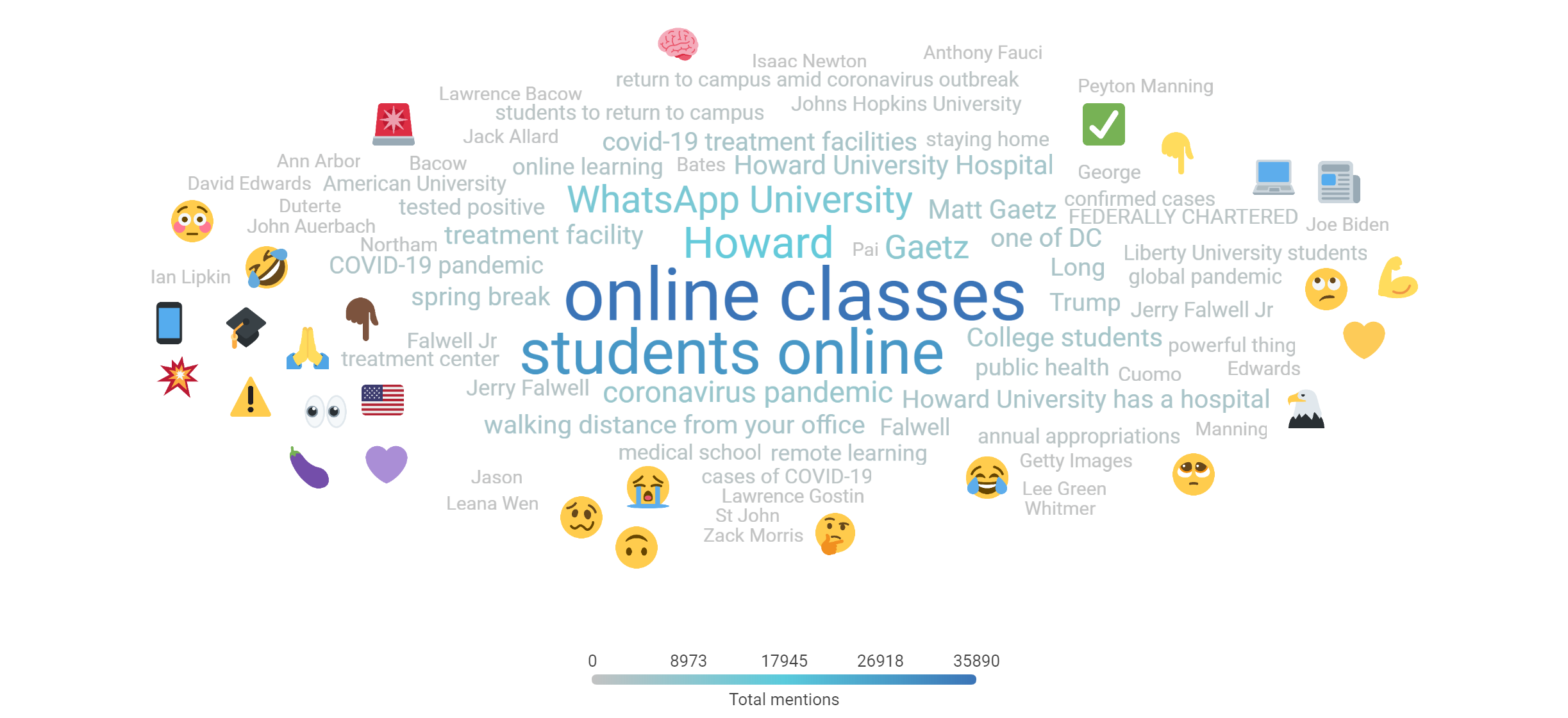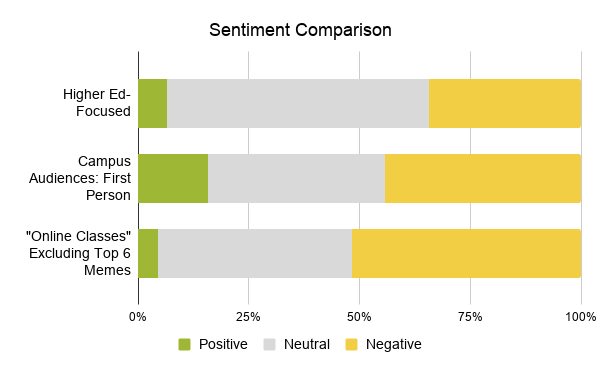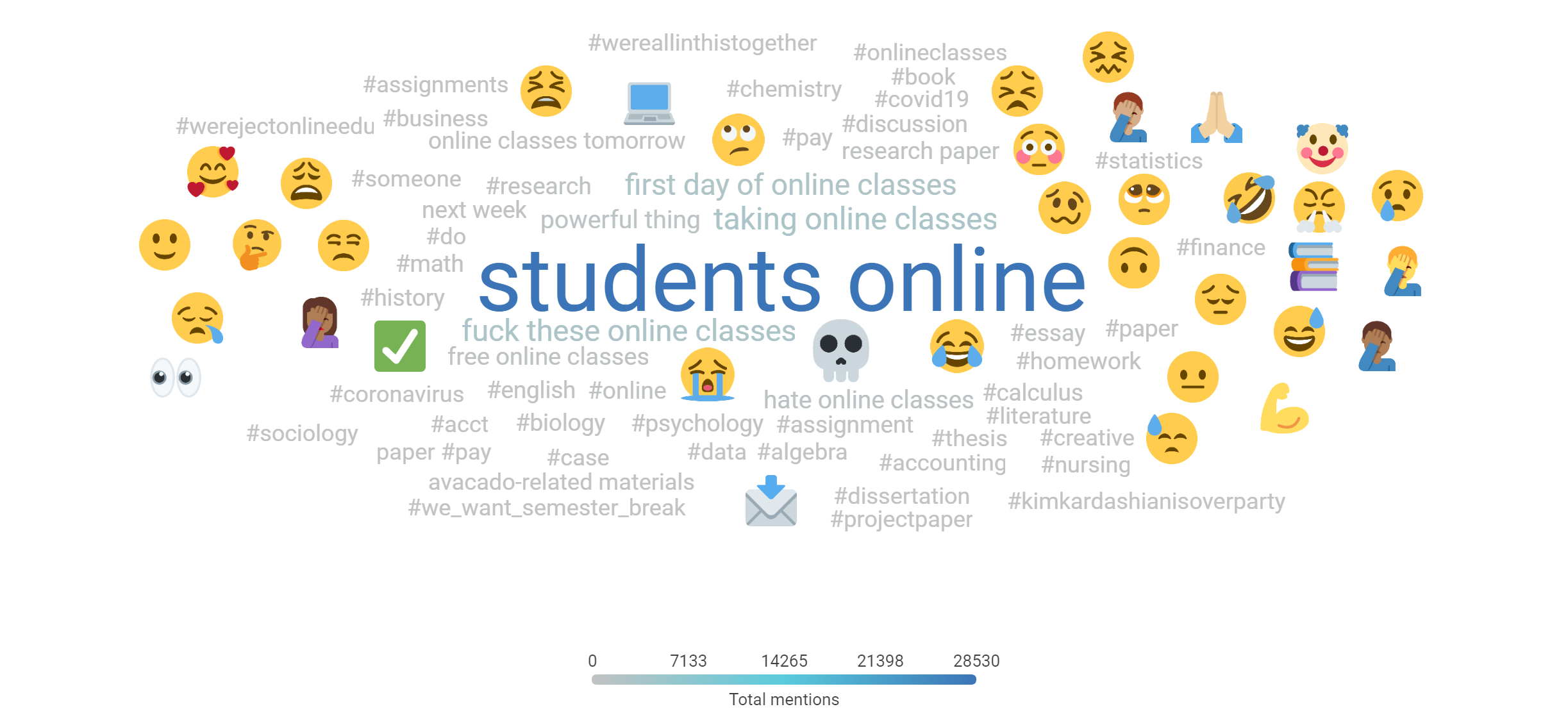Coronavirus Higher Education Industry Briefing: March 27

Online Class Meme Themes
Today’s Briefing analyzes publicly available online conversation about coronavirus and higher education from March 24-26. In this analysis of volume, topics, sentiment, and key audiences, we highlight political mentions, review continued negative sentiment, and examine the conversation about online courses through the lens of memes.
Because of the changing nature of social media data and our understanding of the conversation, each briefing covers a distinct point in time. Comparisons from briefing to briefing may be helpful, but we can’t draw correlations like we could if we were using other datasets such as surveys or historical social media data.
Conversation Decreased Slightly
We identified about 482,000 mentions of coronavirus and higher education March 24–26, ranging from 135,000–200,000 mentions per day. Remember, our industry-level analysis only captures general higher education mentions. If someone mentions the name or acronym of an institution without using a higher ed term (e.g., campus, university, college, classes, etc.), it’s not included in this analysis. Actual volume of conversation across the industry is likely much higher.
Weekday volume is slowly decreasing week-to-week, but higher education remains a focus of these conversations. 35 percent of mentions were higher ed-focused.

Social Media Rules, But Many Students Shared Experiences Elsewhere
General conversation about coronavirus and higher education mostly occurred on social media (77 percent of all mentions and 84 percent of higher ed-focused mentions). Students, however, continued to exhibit different conversation patterns. When students shared their experience in the first person, 46 percent of the posts were on forums (mostly Reddit), 27 percent were on blogs (mostly Tumblr), and 27 percent were on social media. Remember that due to data access restrictions, we aren’t including Facebook, Instagram, Snapchat, TikTok, or LinkedIn in our analysis. Your campus social media manager is the best source of information regarding conversation on those networks. Depending on the software used, social listening for a specific campus can include Facebook and Instagram mentions once account managers verify admin access.
Trending Topics: Online Classes, Politics, Misinformation, WhatsApp University
Clearly, the transition to online learning is a topic of conversation, demonstrated by the size of the phrases “online classes” and “students online” in the following topic cloud, which displays the top 100 phrases, people, and emojis within the higher ed-focused conversation. We’ll dive into that topic later in this Briefing.

Politics were another common topic, largely because of the funding allocated to higher education institutions in the relief package working its way through congress. Howard University became a focus of this conversation when Matt Gaetz, a Florida member of the U.S. House of Representatives, questioned the appropriations for Howard University. He was called out on Twitter, with comedian Steve Hofstetter and senator Kamala Harris among his most popular detractors. Howard University weighed in without directly responding to any politicians, tweeting “HU Facts: Howard University operates a world-class medical simulation center, 6,000 square foot state-of-the art simulated learning environment, offering resources to advance a comprehensive healthcare education program.”
While not yet trending, we started to see mentions of an emergency resolution released Wednesday, March 25, by a coalition of College Republican groups calling for greater immigration restrictions. A press release purporting to be from the University of Maine College Republicans was circulated by the Twitter account for the America First Students club at UCLA, and the conservative websites The Gateway Pundit and National File reported on it, citing student tweets from additional campuses who support the resolution, as well as tweets from students and government officials.
The trending topic WhatsApp University is actually a commentary on misinformation and fake news related to the coronavirus. Originating in India, the term refers to propaganda, rumors, and lies that are regularly spread through the app. One common mention was a viral tweet that stated, “My mum has a PhD on Corona Virus [sic] from WhatsApp University.” This was a way of saying that family members were getting their information about the virus from propaganda rather than reliable news and medical sources.
There were plenty of mentions of Liberty University president Jerry Falwell Jr.’s decision to welcome students back to campus while nearly every other campus in the nation is requiring students to stay away.
One of the notable mentions refers to a recent graduate who is fighting for his life as he receives treatment for COVID-19. 25-year-old Jack Allard, a 2016 graduate of Bates, was in critical condition this week as first reported by The Bates Student on March 23. The story was picked up by national news outlets, including US Lacrosse Magazine (Allard played Lacrosse at Bates).
Sentiment Moved from Bad to Worse
34 percent of higher ed-focused mentions were negative—the highest negative percentage since we started our coronavirus higher education analysis. First-person mentions from key campus audiences were more negative (44 percent). The sentiment drops further when we just look at the approximately 90,000 mentions of “online classes,” excluding the top six memes (more on memes in a bit). 52 percent of mentions of online classes were negative this week.
 Focused Insights: Conversation about Online Classes
Focused Insights: Conversation about Online Classes
In prior Briefings, I dove deep into the first-person conversation from students and families. Each time I found the source of student conversation evolved. Our March 17 Briefing found student conversation spreading rapidly via word of mouth. The March 20 Briefing found first-person narratives in the media and the March 24 Briefing found students widely sharing their personal stories on multiple sites (notably Tumblr), forums, and social media.
I plan to get back to our “hidden voices” insights next week, but today I want to focus on the conversation about online classes (a lot of it is from students). From March 24–27, 67 percent of conversation was about the transition to online learning (n=324,490). It’s clearly the largest topic of conversation surrounding coronavirus and higher ed. The way students and others discuss online conversations is a reflection of how they’ve communicated about life and politics for years: memes.
Memes are a main way students expressed their feelings about the transition to online learning. To demonstrate, let’s focus on one key phrase: “online classes.” This phrase appeared in 45 percent of conversation about the transition to online learning (n=144,950). Six memes accounted for more than a third of those mentions.
Excluding the memes, there were still more than 90,000 mentions of “online classes.” After removing the news mentions, here are the top 100 phrases, emojis, and hashtags related to the discussion of online classes. Remember, online conversation reflects the language of its participants, and some have been swearing a lot these days.

The emojis represent confusion, anger, embarrassment, frustration, and sadness. There are a few glimpses of positivity, but they’re greatly outnumbered. The sentiment for this conversation is 52 percent negative and 4 percent positive. All of those hashtags referencing specific subjects? It’s not students talking about their course experience; it’s “essay spam.” We see it all the time at Campus Sonar—essay mills and cheating schemes trying to attract students with promises of quick fixes to their stress.
I would love to spend more time analyzing the remaining mentions; there are likely millions to work with during the first month of online classes. But that’s beyond the scope of this Briefing. I’ve developed a research question I hope we can investigate one day: Do the memes related to online classes and remote learning reflect the themes of individuals’ conversation about the topic? I suspect meme themes are a glimpse into the emotions and experiences of our students. I wonder if current high school and junior high students who see these memes today will remember this period of higher education disruption. Will online course stigma increase? Will students be less likely to consider campuses referenced negatively in memes? Some of these memes (or adapted versions) are making the rounds on TIkTok, Snapchat, and Instagram where prospects see them but higher ed professionals and social listening software are less likely to.
At Campus Sonar, Steve App gave himself the title Chief Donut Officer. Today, I’m declaring myself Chief Meme-Splainer. Memes are a growing part of all online conversation—especially about higher education. Memes have been on my mind since Dr. Jim Henderson, President and CEO of the University of Louisiana System, told a room full of higher education advancement leaders “Facts don’t change opinions, memes do.”
Memes matter. I’m going to share the top six memes about online classes from March 24–26. Don’t skip this section. Use it to help you understand how students feel and develop empathy.
What the Memes Mean
Perhaps you don’t know what the word “meme” means. That’s okay, but it’s time you learn because Merriam-Webster added it to the dictionary in 2015. It has two definitions.
- An idea, behavior, style, or usage that spreads from person to person within a culture.
- An amusing or interesting item (such as a captioned picture or video) or genre of items that is spread widely online, especially through social media.
Each of the top six memes follow one of the following two formats.
- “Caption this” tweet. The meme starts by someone posting an image or short video clip with the phrase “caption this” or “bomboclaat.” Then, people use the quote retweet function to share a caption for the video or image, putting it into context of their experience or beliefs. Sometimes the caption shares the perspective of one person or group and indicates the video is another person or group’s response. No, I didn’t know what “bomboclaat” meant in this context until today either. Here’s an explainer if you’re up for it.
- Viral tweet. While not originally intended to be a meme, some text-only tweets become incredibly popular and go viral, essentially reaching meme status.
Meme #1: A Thousand Emails about Classes
A toddler is already unhappy. She’s crying. In an attempt to amuse herself with a nerf gun, she accidentally shoots herself in the face with the foam projectile, increasing her crying. Multiple levels of sadness and angst are expressed in just six seconds. Destiny, a member of the Austin Peay State University class of 2023 who previously shared she accumulated over $1 million in scholarships, captioned this to indicate it was her response to teachers sending a thousand emails about online classes. As of this morning, her tweet had been retweeted almost 75,000 times and received over 175,000 likes. This is a result of the message resonating, not any sort of online celebrity; Destiny only has 233 followers.
Meme #2: I’d Rather Be in School
The “caption this” prompt is just the words “online class.” Leslie, a student from the Bronx, responded with, “I’d rather be in school than take online classes. You get distracted easily.” He went on to say the people he lives with are loud and he gets sleepy. Clearly this struck a chord with people. It was retweeted over 30,000 times and garnered nearly 100,000 likes. He’s not an internet celebrity either; Leslie has 1,394 followers.
Meme #3: More Confusing than “Actual School”
In a tweet that went viral, Gio (who may be a high school student) mused at 1:40 a.m. March 25, “Is it me or is online classes more confusing than actual school.” With 46,000 retweets and 208,000 likes, some people seem to share Gio’s sentiment.
Meme #4: Online Classes Aren’t the Same; I’m Trapped in My House
Harrison, a student at Florida State, has some very strong opinions about online courses. On March 24 he shared, “How can they even say we are getting the same level of education with online classes? How? We simply are not! I cannot focus if I am trapped in my house all day long!” He actually had more to say than that, and there were a lot more all-caps words, but there are some things I don’t need to repeat on this blog. The internet seemed to vibe with what he was saying though: 29,000 retweets and over 200,000 likes. He does have a little bit of internet celebrity in his favor; between two Twitter accounts, he has over 650,000 followers, including some Sonarians.
Meme #5: I’m Confused
I’m going to need to sensor this one a bit. Hopefully by now you’ve determined what asf means, because that’s a word I’ll allow in word clouds but I’m not about to write in text on our blog. Daniel, a college senior simply says, “F these online classes I’m confused asf.” With over 6,000 retweets and 18,000 likes, others are clearly confused as well. The more concerning tweet is Daniel’s reply to himself, which just says, “dropping out f it.” I sincerely hope Daniel completes his final semester and gets his degree as planned.
Meme #6: I Didn’t Sign Up for This
Let’s set the scene for this 5-second clip from the 2003 film Holes. A young girl in a cowboy hat leans on a shovel in the middle of the desert and says, “I’m tired of this Grandpa!” Grandpa looks up at her from the hole he’s digging and yells, “That’s too damn bad! You keep digging!”
A student from Lamar University used the “caption this” format to express his feelings about online classes. His caption: “College students: I didn’t sign up for online classes.” He then attributes the Grandpa’s response in the video clip to universities. So far, this meme has almost 10,000 retweets and over 30,000 likes.
More than Memes
These memes communicate that students are overwhelmed, confused, unhappy, and struggling. While this may not be the experience of all students, it’s resonating with their peers and strangers on the internet. What’s even more interesting are the replies to these viral posts; they’re full of students sharing their experiences and struggles. Memes are a window into the student experience. If we take the time to understand them, we’ll be better equipped to serve students.
Summary and Recommendations
Conversation volume about coronavirus and higher ed is slowly decreasing week-to-week, but remains elevated. The majority of conversation occurred on social media, although students continued to exhibit different conversation patterns, sharing their experiences on Reddit and Tumblr as much or more than social media. Online classes were the most common topic, followed by politics, misinformation, stories about individuals sickened with the virus, and the controversial decision at Liberty University. Negative sentiment increased, particularly when online classes were discussed.
Memes are a significant portion of the conversation, and they should not be dismissed. Meme themes provide a glimpse into the emotions and experiences of our students. The top six memes we highlighted today indicate that students are overwhelmed, confused, unhappy, and struggling. Consider that as you communicate with students, families, and the faculty teaching online courses. Ensure faculty have the appropriate tools and resources (including referrals to other campus partners) to support students.
Memes also inform opinions, and current high school and junior high students who see these memes today will remember this period of higher education disruption. If you see these memes or similar sentiment being shared within your campus community, keep your eye on the comments. That’s where you can have meaningful one-on-one interactions with prospective and current students.
Stay Connected with Future Briefings
The Coronavirus Higher Education Industry Briefing is new territory for Campus Sonar.
We’ll be back on Tuesday, March 31 with our next briefing. I sincerely hope you get some time to yourself or with the ones you love this weekend. This pandemic is not letting up, and it’s getting personal for most of us. My former colleagues from the first campus I worked at lost a coworker to COVID-19 this week. Find joy where you can, and tell the important people in your life what they mean to you.

